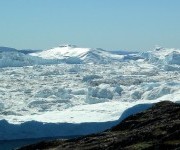The people in Fiesch, Switzerland, live near the massive Aletsch and Fiesher glacier, which, like most glaciers, is melting rapidly. But it’s OK — because the town’s highly religious residents have come up with a solution with proven results: prayer.
They know it works, they say, because it’s prayer that got the glacier to recede. In the 1600s Europe suffered a mini-ice age, so the glaciers grew, which meant that sometimes pieces of them broke off, fell into nearby Lake Märjelen, and voila, massive floods, property ruined, lives lost, desperate desire to invoke help of Almighty Creator activated. So since 1674 the people of this strongly Catholic town have made an annual pilgrimage up to the mountains to intone a special prayer to make the glacier back off. And wouldn’t you know it? Around the 1860s — wait a minute, isn’t that when the Industrial Revolution started? — it started to do exactly that.
“We prayed for the ice to recede, and our prayer worked — too well,” said Herbert Volken, mountain guide and mayor of Conches, the district that includes Fiesch. Indeed. The glaciers has receded at the rate of 75 feet a year, causing some different problems: less drinking water, more forest fires, and a decrease in tourism.
So in 2009, they implored the Vatican to allow them to change the words of the prayer, and on July 31, over 100 people gathered in the nearby mountains to chant “Glacier is ice, ice is water, water is life,” with priest Toni Wenger, who then openly begged God to stop the glaciers from melting.
Of course after 300 years of asking God to do one thing to the Aletsch and Fiesher glaciers it is unlikely He would reverse course so quickly. Hanspeter Holzhäuser, a University of Bern geographer and an expert on human-made climate changes in the Aletsch and Fiesher glaciers, is perhaps a few steps shy of cautiously optimistic, commenting, “Even if all the new prayer does is to draw attention to man-made global warming, it’s a good thing.”




